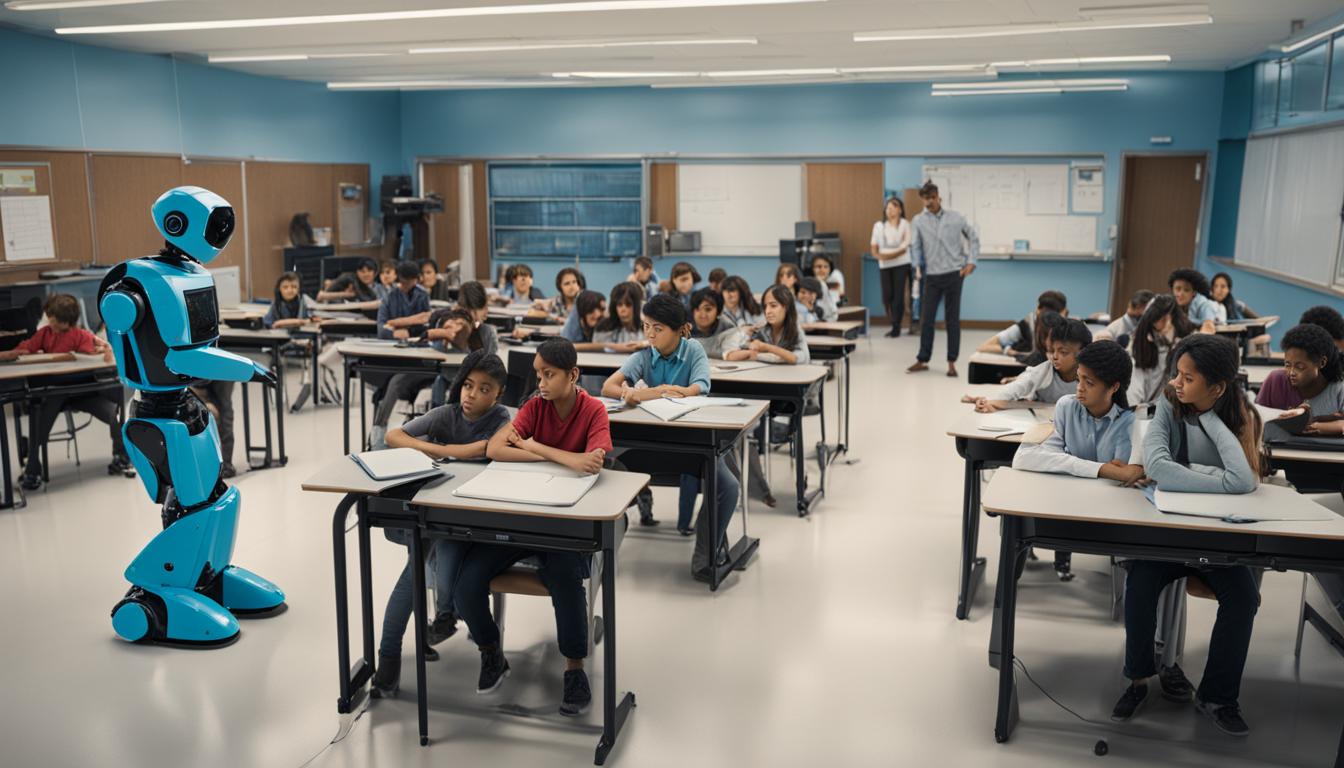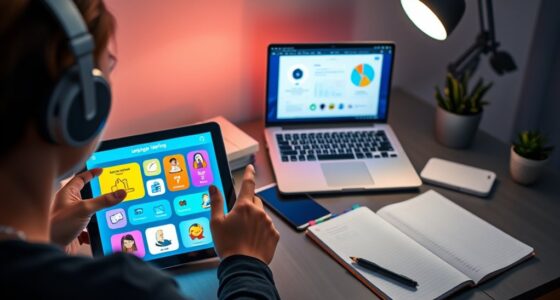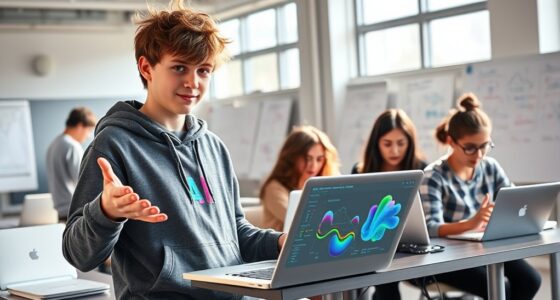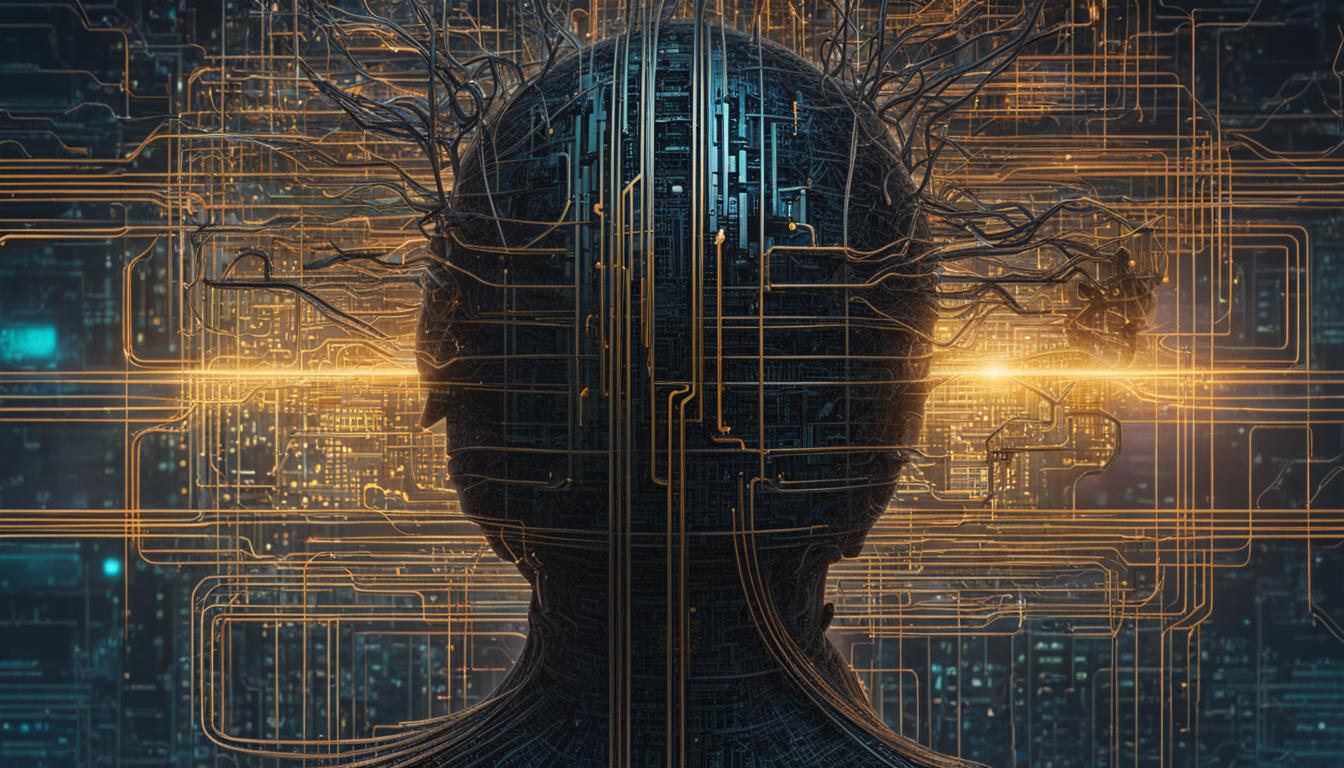Did you know that personalized learning has been shown to boost student engagement by 20%?
In our article, we will explore strategies that elevate education through personalized learning.
We’ll delve into the benefits and key elements of this approach, as well as how technology can be used to enhance it.
Additionally, we’ll discuss methods for assessing and monitoring progress in personalized learning.

Join us on this journey to unlock the full potential of education for all learners.
Key Takeaways
- Personalized learning tailors instruction to meet the unique needs, interests, and abilities of each student, improving understanding and retention of information.
- It emphasizes student agency and empowerment, allowing learners to take ownership of their education and fostering a deeper sense of engagement and ownership over education.
- Technology enhances the effectiveness and efficiency of personalized learning by providing adaptive learning experiences, promoting collaboration and communication, and creating a flexible and adaptive learning environment.
- Assessing and monitoring personalized learning progress through formative assessments, performance tasks, and data collection and analysis ensures the effectiveness of personalized learning and tailors instruction to individual needs.
Defining Personalized Learning
We believe that a clear understanding of personalized learning is essential for maximizing educational outcomes.
Personalized learning approaches focus on tailoring instruction to meet the unique needs, interests, and abilities of each individual student. Rather than employing a one-size-fits-all approach, personalized learning recognizes that students learn best when instruction is customized to their specific learning styles and preferences.
This approach emphasizes the importance of student agency and empowerment, allowing learners to take ownership of their education. Individualized instruction plays a crucial role in personalized learning, as it allows educators to adapt their teaching methods and content to address the diverse needs of their students.

Benefits of Personalized Learning
One of the key benefits of personalized learning is the ability to tailor instruction to meet the unique needs, interests, and abilities of each individual student.
With individualized instruction, students are able to learn at their own pace, focusing on areas where they need more support and moving quickly through material they’ve already mastered.
This targeted approach to learning not only helps students to better understand and retain information, but also fosters a deeper sense of engagement and ownership over their education.
When students are actively involved in the learning process and have a say in how they learn, they’re more motivated and invested in their own academic success.

This increased student engagement leads to improved outcomes and a love for lifelong learning.
Key Elements of Personalized Learning
The inclusion of students’ own interests and abilities is a key element in personalized learning. When education is tailored to individual students, it becomes a truly transformative experience. Here are four elements that make personalized learning so powerful:
-
Choice: Allowing students to choose their own learning activities and pathways empowers them and fosters a sense of ownership in their education.
-
Flexibility: Personalized learning adapts to the unique needs and learning styles of each student, providing them with the support and resources they need to succeed.

-
Collaboration: By promoting collaboration and teamwork, personalized learning encourages students to learn from and with each other, fostering a sense of community and shared responsibility.
-
Authenticity: Personalized learning connects students to real-world experiences and challenges, making their learning more relevant and meaningful.
Implementing Technology in Personalized Learning
Implementing technology enhances the effectiveness and efficiency of personalized learning, allowing us to tailor education to the unique needs and interests of each student. Technology integration plays a crucial role in creating a flexible and adaptive learning environment.
By utilizing adaptive software, we can provide students with personalized learning experiences that adapt to their individual progress and challenges. This software can analyze student data, identify areas of strength and weakness, and provide targeted interventions and resources. It also allows for real-time feedback, enabling students to track their progress and make adjustments accordingly.

Furthermore, technology enables collaboration and communication among students and teachers, fostering a sense of community and support. By leveraging technology in personalized learning, we empower students to take ownership of their education and facilitate their path to success.
Now, let’s explore how we can assess and monitor personalized learning progress.
Assessing and Monitoring Personalized Learning Progress
Now, let’s delve into how we can assess and monitor the progress of personalized learning to ensure its effectiveness and tailor instruction to meet the individual needs of each student. Here are some assessment methods and data tracking strategies that can help us in this process:
-
Formative assessments: Regularly assessing students’ understanding during the learning process allows us to provide immediate feedback and make necessary adjustments to instruction.

-
Performance tasks: Assigning real-world tasks that require students to apply their knowledge and skills helps us gauge their mastery and identify areas for improvement.
-
Digital tools: Utilizing technology-based platforms and software enables us to collect and analyze data on students’ progress, allowing for personalized feedback and targeted interventions.
-
Self-assessment and reflection: Encouraging students to reflect on their own learning and set goals fosters metacognitive skills and empowers them to take ownership of their progress.
Frequently Asked Questions
How Does Personalized Learning Impact Students’ Social and Emotional Development?
Personalized learning has a significant impact on students’ social and emotional development. It improves their well-being by fostering a sense of ownership, autonomy, and self-efficacy. Additionally, it positively affects academic achievement, leading to a more holistic and fulfilling educational experience.

What Role Do Parents and Guardians Play in Supporting Personalized Learning?
As parents and guardians, we play a crucial role in supporting personalized learning. Our involvement is like a compass, guiding our children towards success. Collaboration between us and educators is vital for their growth and development.
Are There Any Potential Drawbacks or Challenges to Implementing Personalized Learning?
There can be potential limitations and implementation challenges when it comes to personalized learning. However, it is important to address these obstacles in order to create an education system that truly elevates and liberates all learners.
How Does Personalized Learning Address the Needs of Students With Learning Disabilities or Special Educational Needs?
Personalized learning effectively adapts to address the individual needs of students with learning disabilities or special educational needs. By tailoring instruction, providing accommodations, and offering support, it ensures inclusive and equitable education for all.
What Resources or Professional Development Opportunities Are Available for Educators Interested in Implementing Personalized Learning in Their Classrooms?
Professional development opportunities and online resources are available for educators interested in implementing personalized learning in their classrooms. These resources provide valuable guidance and support to help educators effectively incorporate personalized learning strategies.

Conclusion
In conclusion, personalized learning is a game-changer in education. By tailoring instruction to individual students’ needs, it allows for greater engagement, motivation, and academic success.
With the right technology and strategies in place, educators can create transformative learning experiences. From personalized assessments to ongoing monitoring, students can truly thrive in this dynamic educational environment.
It’s like giving them the keys to unlock their full potential, propelling them towards unparalleled achievements.
Personalized learning truly revolutionizes education like nothing else!











